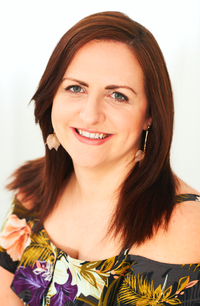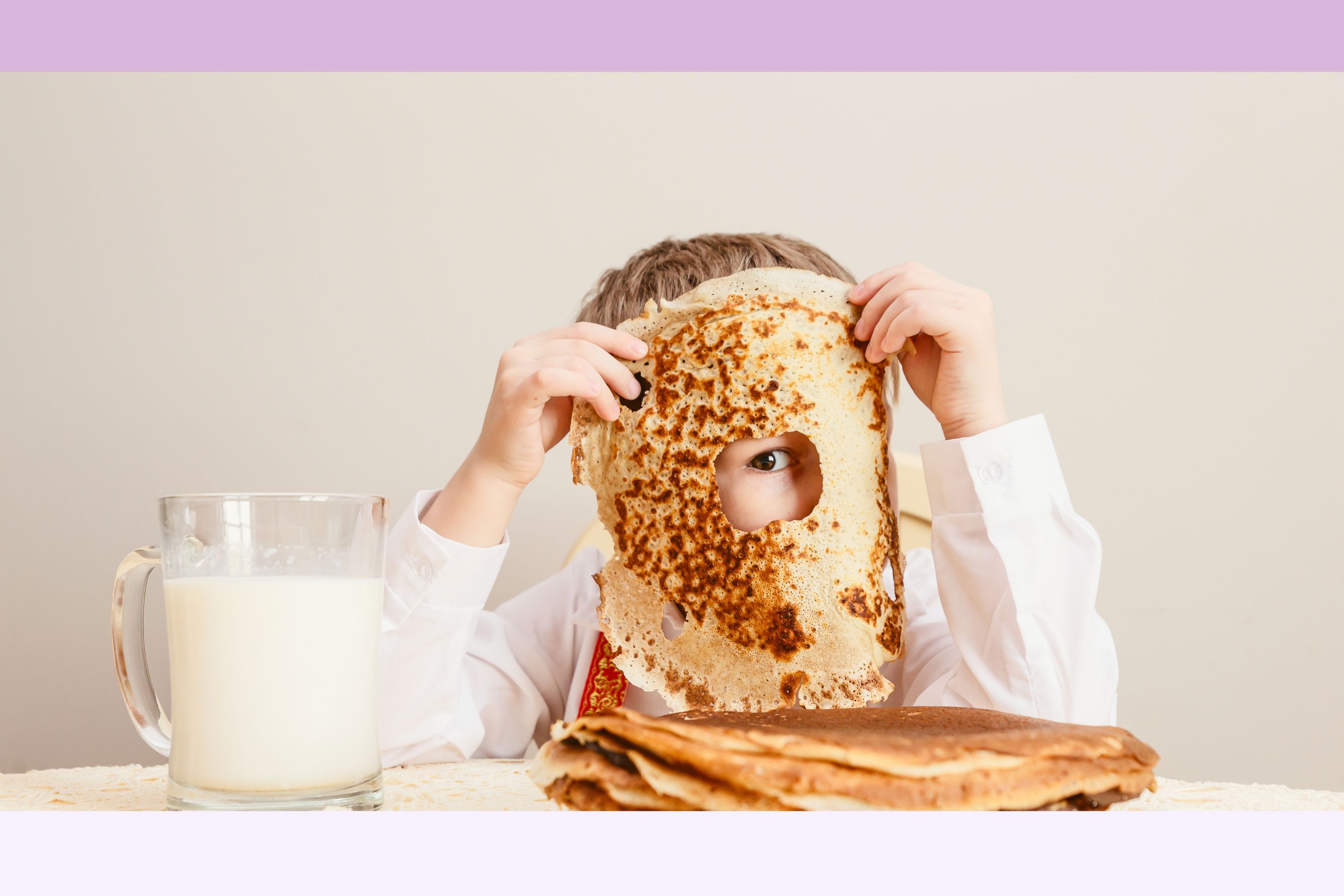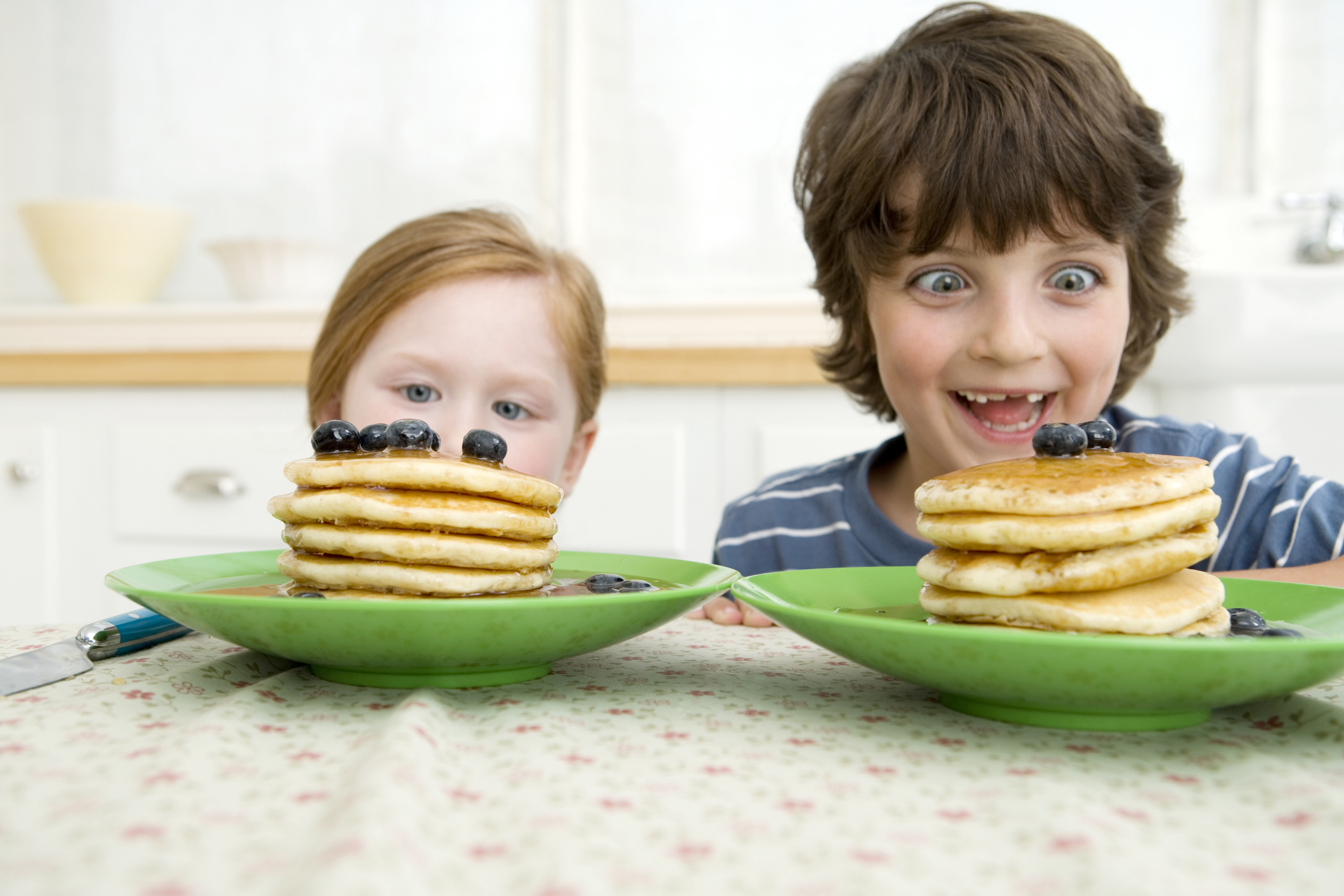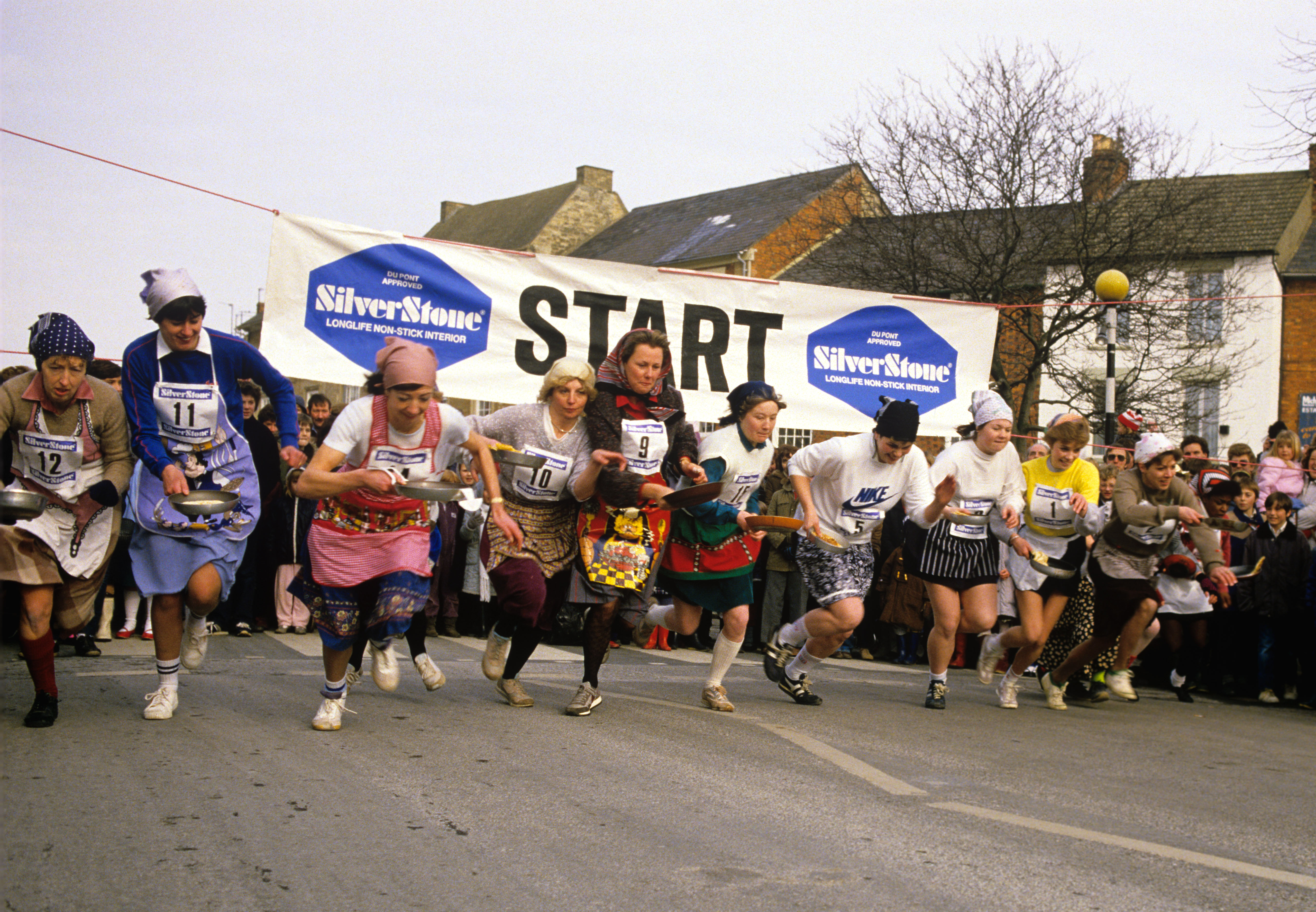When is Pancake Day 2026 - and why do we celebrate Shrove Tuesday? 25 fun facts for kids
The ultimate guide to Pancake Day 2026...

Ellie Hutchings

We look forward to whipping up our favourite pancake recipes every year, but when is Pancake Day 2026 - and why do we celebrate Shrove Tuesday?
Pancake Day has to be one of our favourite holidays. Whether you stick to a classic easy pancake recipe with just sugar and a squeeze of lemon or enjoy American pancakes smothered in chocolate, we're all hunting for the best pancake fillings and toppings in the lead-up to the big day.
But while we all seem to love eating pancakes on this particular day, have you ever wondered why we celebrate Pancake Day - also known as Shrove Tuesday - and where the tradition comes from? We explain the story behind the day, so keep reading to find out when is Pancake Day in 2023, why we celebrate it and we've also picked out 25 fun facts for kids...
When is Pancake Day 2026?
Pancake Day 2024 falls on Tuesday 13th February. Interestingly, though the date of Pancake Day changes every year, it is always 47 days before Easter Sunday. This year, Easter Sunday is on March 31st - and this is calculated around the first full moon that follows the spring equinox in March.
In addition, Pancake Day - traditionally known as Shrove Tuesday - is on a Tuesday every year, as the name suggests. A different way to work out the date is to remember that it immediately precedes Ash Wednesday – another Christian celebration that signals the beginning of Lent.
A post shared by where the pancakes are
A photo posted by wherethepancakesare on
Why do we celebrate Shrove Tuesday?
The origins of Pancake Day, or as it is traditionally known, Shrove Tuesday, are rooted in Christian religion. Shrove Tuesday is a day of feasting before the 40-day fast of Lent, which begins a day later, on Ash Wednesday.
Like Easter, the date can change year to year because it’s calculated by the lunar calendar. However, it always falls between 3 Feb and 9 March and will be 47 days before Easter Sunday.
Parenting advice, hot topics, best buys and family finance tips delivered straight to your inbox.
The meaning behind Pancake Day's original name, Shrove Tuesday, comes from the religious tradition of going to confession to be absolved from sin ahead of the 40-day fast of Lent. 'Shrove' in Shrove Tuesday, comes from the word 'shrive' - defined in Collins English dictionary as: "to hear the confession of (a penitent)" or "to confess one's sins to a priest in order to obtain sacramental forgiveness."
Shrove Tuesday became the name for the traditional day of confession before Lent, which is the season in the Christian calendar that remembers the Bible story of Jesus’ 40-day journey through the desert. It’s often a time when Christians and non-Christians alike give up a particular treat or bad habit 'for Lent'.
Traditionally, Christians would abstain from eating luxury foods, which included sugar as well as products that go off quickly - like eggs, fat and milk. To make sure these food were used up before lent began, they were mixed with flour (a cheap ingredient) to make pancakes. Cost-effective and tasty – what could be better?

Why are pancakes eaten on Shrove Tuesday?
Shrove Tuesday was traditionally the last opportunity to use up eggs and fats. Hello pancakes! The perfect way of using up these ingredients. Eating pancakes on Shrove Tuesday was a practical choice before it became an annual tradition and tasty treat.
We’ve actually been eating pancakes for thousands of years – they’re made all over the world using different local ingredients. These days pancakes can be topped with anything from savoury pancakes with meat to indulgent double chocolate chip pancakes.
Far from the comfort food recipes we like to try today, the ancient Greeks and Romans liked a simple version of pancakes for breakfast. They made pancakes using just wheat flour mixed with water and a pinch of salt, then fried in olive oil. Typically they would be topped with honey, and sesame seeds or dates.
Why do we have Pancake Day races?
While the reason we eat pancakes on Pancake Day has a fairly clear historical roots, the origin of pancake races is less clear. However, one of the best-known Pancake Day races in the country, in Olney, Buckinghamshire, is said to have been inspired by something that happened in 1445, when a woman of Olney heard the shriving bell while she was making pancakes and ran to the church in her apron, still clutching her frying pan. In honour of this tale, women compete in aprons and scarves in the Olney pancake race to this day.
Shrove Tuesday being a day of general merriment, other traditions have sprung up. In Scarborough, Yorkshire, people take to skipping on the promenade. Long ropes are stretched across the road with ten or more people skipping on one rope. The origins of this custom are not known but skipping was once a magical game, associated with the sowing and spouting of seeds.
And Shrove Tuesday football matches, which date back as far as the 12th century, still take place in Ashbourne in Derbyshire, Alnwick in Northumberland, Atherstone in Warwickshire, Sedgefield in County Durham and St Columb Major in Cornwall.

25 fun pancake facts for kids
- Traditionally meat and dairy were only forbidden for 40 days of Lent - nowadays people give up all kinds of things from chocolate to online shopping and smoking.
- Shrove Tuesday became the last opportunity for people to use up eggs and dairy fats so making pancakes was the perfect way of using up these ingredients.
- You only need five ingredients to make pancakes - 60g plain flour, a Pinch of salt, 1 medium egg, 175ml of milk and Oil or butter for frying. These are just the basic ingredients, however. It's not how everyone likes their pancakes, as scotch pancakes and American pancakes are just two of the other types that are popular in the UK. These are a little thicker, often come covered in various toppings and create that classic pancake stack look when you pile them up. Gluten free pancakes are also another great choice for anyone with food intolerances as they use specialist ingredients, like coconut flour. While vegan options, such as the Hairy Bikers' vegan pancakes, are becoming more popular every year. These don't use any eggs or milk but that doesn't mean you have to compromise on toppings, as you can make a whole number of exciting pancake recipes vegan. Our favourites are the cinnamon swirl vegan pancakes and vegan salted caramel pancakes. There are also options for those looking to make healthy pancakes, with vegan protein pancakes as another popular option. 2-ingredient banana pancakes are ideal for anyone watching their weight and you can even make pancakes with avocado, for a special brunch treat. So whatever you fancy this Shrove Tuesday, there really are recipes for everyone to celebrate the meaning of Pancake Day.
- Pancake Day is celebrated in many countries worldwide, especially in English-speaking countries such as Ireland, Australia and Canada. Other countries also celebrate the day but have different names for it.
- In France Pancake Day is known as Mardi Gras (which translates to 'Fat Tuesday'), the name relates to eating fatty foods before giving them up before Lent.
- In Spain, Pancake Day is called Día de la Tortilla ('Omelette Day') people in Spain celebrate by eating a Spanish omelette, or tortilla, instead of pancakes.
- In Madeira, Portugal Pancake Day is known as Terça-feira Gorda, and is celebrated by eating malasadas. These are deep-fried balls of dough coated with sugar - similar to doughnuts.
- In Scandinavia Shrove Tuesday is celebrated in countries such as Sweden, Finland, and Norway with Semla (or fastelavnsboller), which is a sweet bun filled with almond paste and cream.
- Peanut butter pancakes and Spinach Pancakes are now more popular amongst Brits than traditional toppings like lemon, according to a survey by Hello Fresh. Senior Recipe Development Manager at HelloFresh, Mimi Morley commented, “Our data reveals the UK has a sweet tooth when it comes to Pancake Day with only two savoury toppings making the top 10. Shockingly, more traditional toppings such as lemon and sugar didn’t make the top five spots showing some more modern, experimental recipes have become Pancake Day favourites.”
- Banana pancakes as the UK’s favourite by a landslide, followed by blueberry pancakes and chocolate pancakes. Through analysis of the average number of searches per month for each type of pancake topping, data revealed banana pancakes are the most a-peeling as they slip into first place as the UK’s favourite choice of topping with over 33,000 searches. Second to blueberry, with a 6,600 search gap.
- The largest ever pancake made was 49ft (15.1m) wide - the same size as a double-decker bus - and one inch thick (2.5cm). It was created in Rochdale, Greater Manchester in 1994 by the Co-Operative Union Ltd. It weighed a whopping three tonnes - as much as a hippo! It was eventually cut into 15,000 pieces, which were sold to raise money for local charities (though apparently it wasn’t very tasty).
- A man once ran a marathon while tossing a pancake and completed it in just over three hours. Impressive!
Watch our classic pancake video:
- The record for the most pancakes served in eight hours is 17,182 pancakes at the Calgary Stampede, setting the new Guinness World Record, according to reports by NDTV.
- The oldest pancake dates back to ancient Greece. Around 600 BC an ancient Greek poet described pancakes in writing.
- Pancakes were the last thing a man called Otzi the Iceman ate before he died between 3350 and 3105 BC. His body was found in 1991 and researchers found evidence that the sweet treat was the last thing inside his stomach.
- Pancakes get their name from being a thin cake that is cooked in a pan, hence the name pancake. But the art is flipping it so that both sides can cook, and without dropping it on the floor! People started using the word pancake in the 15th century and it became standard in 19th Century America. Before this people called them Indian cakes, hoe cakes, johnnycakes, journey cakes, buckwheat cakes, griddle cakes and flapjacks.
- William Shakespeare liked pancakes so much that he often mentioned them in his plays.
- The catchphrase ‘flat as a pancake’ has been in existence since at least 1611, according to the Oxford English Dictionary.
- The first ready-mixed pancake mix sold commercially was known as Aunt Jemima pancake flour. It was invented back in 1889 in St Joseph, Missouri.
- The highest pancake toss recorded was 9.47m (31ft 1in) and was set in New York in 2010 by American Dominic Cuzzacrea.
- You can eat pancakes in the shape of Mickey Mouse if you visit Magic Kingdom Park at the Walt Disney World resort and stop off at Frontierland’s River Belle Terrace.
- The world’s most expensive pancake ever sold cost a staggering £885.29 ($1,116) per serving. It is thought to have been made by the Radisson Blu Edwardian Hotel’s five-star Opus restaurant. The topping featured pink champagne, lobster, truffles and caviar.
- There is such a thing as pancake syndrome (and while it’s not caused by eating too many) it's an allergic reaction of someone who has eaten pancakes in tropical regions where certain mites can contaminate the flour in pancakes.
- The tallest pancake stack ever made stood at three feet and four inches (101.8cm) high and was made by James Haywood and Dave Nicholls using 213 pancakes. The record was made in 2016 by Centre Parcs Sherwood Forest in Rufford, England.
- The record for the most people tossing pancakes at the same time is 890. It was achieved at an event organised by the University of Sheffield (UK) in 2012. Over 1,500 people signed up for the event. Smaller is certainly better for flipping, though you’d be hard-pressed to bean Dean Gould from Suffolk whose official record is 399 flips in 2 minutes (off the record, he says he’s managed 424!).
In other pancake news, you might like to try this easy pancake recipe, or check out these easy pancake toppings, and if you're not a fan of lemon juice try this orange syrup for pancakes recipe.
Happy Pancake Day!
Video of the Week:

Selina is a Senior Family Writer for GoodtoKnow and has more than 16 years years of experience. She specialises in royal family news, including the latest activities of Prince George, Charlotte, Louis, Archie and Lilibet. She also covers the latest government, health and charity advice for families. Selina graduated from the University of Sheffield in 2006 with a degree in Journalism, and gained her NCTJ and NCE qualifications. During her career, she’s also written for Woman, Woman's Own, Woman&Home, and Woman's Weekly as well as Heat magazine, Bang Showbiz - and the Scunthorpe Telegraph. When she's not covering family news, you can find her exploring new countryside walking routes, catching up with friends over good food, or making memories (including award-winning scarecrows!)
- Ellie HutchingsFamily News Editor